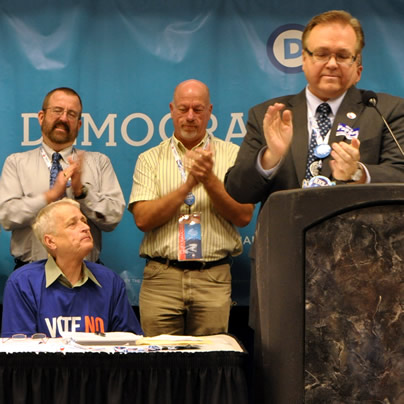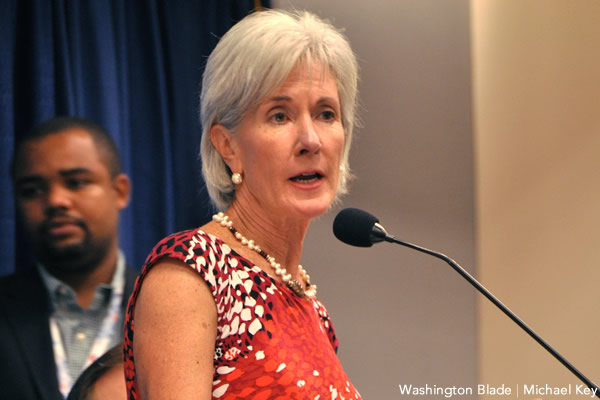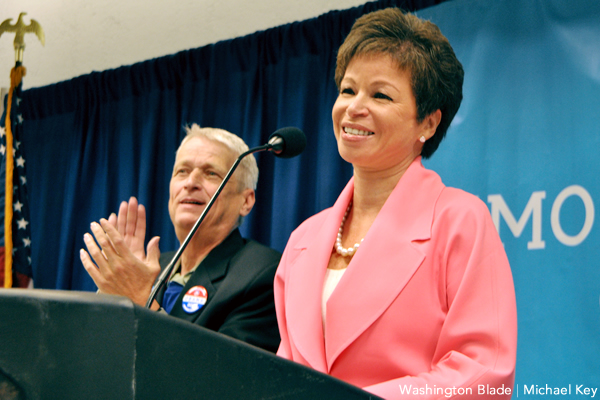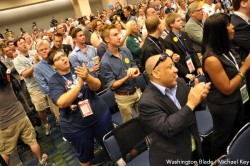National
DNC 2012: Jubilant LGBT delegates vow to support Obama
White House official, HHS Secretary among speakers at Caucus meeting


‘With a change in the White House much of the litany of what you’ve just heard is gone,’ said HHS Secretary Kathleen Sebelius said after listing some of President Obama’s LGBT-related accomplishments.
CHARLOTTE, N.C. — Hours before the Democratic National Convention’s opening session was called to order Tuesday night, a record number of more than 550 LGBT delegates, alternate delegates and convention committee members met as a recognized convention caucus.
Valerie Jarrett, White House Senior Adviser to the President; Kathleen Sebelius, Secretary of the U.S. Department of Health and Human Services; and Tammy Baldwin, the lesbian Democratic House member from Wisconsin who’s running for the U.S. Senate, were among a parade of elected officials and Democratic Party leaders to speak at the caucus meeting.
While greeting each of the speakers with loud applause, many of the LGBT delegates and convention participants said the big news of the day was the size of their caucus and its growth over the past two decades.
“History is being made this week,” said Minnesota gay delegate Rick Stafford, who serves as chair of the LGBT Caucus. “There’s over 550 LGBT Americans who are an official part of the 2012 Democratic National Convention.”
Stafford said that for the first time all 50 states have sent at least one or more LGBT delegates to a Democratic convention.
“Please let everyone know we are here to be seen and heard,” said Brandon Marcus, an out gay member of the North Carolina House of Representatives and one of 12 LGBT delegates and alternates from the Tar Heel state.

‘With your efforts we have been able to move our country forward,’ said Valerie Jarrett, White House senior adviser.
Marcus, who said he was proud to welcome his fellow LGBT convention participants to his home state, said he was certain that the cause for LGBT equality in North Carolina advanced this year despite the fact that voters passed Amendment 1, which added a provision to the state constitution banning same-sex marriage.
“The cause was not lost with Amendment 1,” he said.
Jarrett said efforts by the LGBT Caucus members and their supporters throughout the country on behalf of LGBT rights made it possible for the Obama administration to move forward with the president’s legislative and executive office initiatives on LGBT equality.
“With your efforts we have been able to move our country forward, I believe, in a fair way that respects everybody’s rights,” she said. “And that’s something that’s the foundation of our country and it’s something we can’t take for granted. We have to fight for it and make our country the more perfect union we know it can be.”
Jarrett received a prolonged, standing ovation when she added, “And I believe we are a more perfect union than we were four years ago.”
Sebelius said the repeal of the “Don’t Ask, Don’t Tell” law, which banned gays from serving openly in the military, and the passage by Congress of the Matthew Shepard and James Byrd Jr. Hate Crimes Prevention Act, which authorizes the federal government to prosecute anti-LGBT hate crimes, were an important part of the president’s legislative proposals.
But she said that due to opposition from the Republican-controlled House, most of the Obama administration’s achievements on LGBT rights came from directives from the president and federal agencies and departments under the president’s control.
Non-discrimination polices in federal housing programs, hospital visitation rights for same-sex partners, a ban on employment discrimination for transgender people in the federal workforce are among many of the Obama administration’s LGBT-related initiatives, members of the LGBT Caucus said.
“A lot of what you heard about today is not the law of the land,” Sebelius said. “It really is administrative rules and regulations that are in place and which can be wiped out in a heartbeat. With a change in the White House much of the litany of what you’ve just heard is gone.”
She said one task that LGBT Caucus members could take on to help ensure Obama’s re-election is to reach out to younger voters who support LGBT equality and other progressive causes in large numbers but who often don’t turn out to vote.
“Younger voters are enthusiastically in favor of equality for all,” she said. “But too many of them are not yet engaged in this election. They’re our voters but they are kind of sitting on the sidelines.
“So one of the things that has to be done in the next 63 days is, first, make sure they are registered and secondly get them to vote. And you all have a great microphone to do that – to talk to them about the LGBT issues at stake,” Sebelius said.
Baldwin is scheduled to address the convention Thursday night before President Obama and Vice President Joe Biden deliver their respective speeches. She told the LGBT Caucus she would provide needed support for the president’s initiatives on a wide range of issues, including LGBT equality and health care, if she wins her Senate race.
She said she believes she has a “very close” race against her GOP opponent, former Wisconsin Gov. Tommy Thompson.
Some political observers have said Thompson, considered a GOP moderate on social issues, emerged as the strongest Republican opponent to run against Baldwin when he won the GOP primary.
“An election is about who writes the rules and who benefits from them,” Baldwin said.
Others who spoke before the LGBT Caucus meeting were Randi Weingarten, the lesbian president of the American Federation of Teachers; Brian Bond, the gay director of constituent outreach at the Democratic National Committee and former deputy director of the White House Office of Public Engagement; Andy Tobias, the gay DNC treasurer; Ray Buckley, the gay chair of the New Hampshire Democratic Party; and Steve Kerrigan, the gay CEO of the 2012 Democratic Convention.
A second LGBT Caucus meeting is scheduled to take place Thursday.
As of late Tuesday, convention officials had yet to release a list of the names of the LGBT Caucus members. The Democratic National Committee has not responded to a Washington Blade request for that list.
Stafford and Jerame Davis, executive director of the National Stonewall Democrats, said they have independently compiled their own list of LGBT Caucus members. They said they would consider releasing their lists but did not do so as of Tuesday.
Gay alternate delegate David Meadows of D.C. said he would raise objections to any decision by party officials to withhold the names of the LGBT delegates and other LGBT convention participants.
“All of us checked a box saying we were part of the LGBT community,” Meadows said. “All of us self-disclosed who we are. It makes no sense to withhold the names.”
Meadows was referring to a form that the DNC asked all state parties circulate to Democrats seeking to become delegates to the 2012 convention. The form was part of an effort to assess the party’s outreach to various minorities, including LGBT people.
Federal Government
UPenn erases Lia Thomas’s records as part of settlement with White House
University agreed to ban trans women from women’s sports teams

In a settlement with the Trump-Vance administration announced on Tuesday, the University of Pennsylvania will ban transgender athletes from competing and erase swimming records set by transgender former student Lia Thomas.
The U.S. Department of Education’s Office for Civil Rights found the university in violation of Title IX, the federal rights law barring sex based discrimination in educational institutions, by “permitting males to compete in women’s intercollegiate athletics and to occupy women-only intimate facilities.”
The statement issued by University of Pennsylvania President J. Larry Jameson highlighted how the law’s interpretation was changed substantially under President Donald Trump’s second term.
“The Department of Education OCR investigated the participation of one transgender athlete on the women’s swimming team three years ago, during the 2021-2022 swim season,” he wrote. “At that time, Penn was in compliance with NCAA eligibility rules and Title IX as then interpreted.”
Jameson continued, “Penn has always followed — and continues to follow — Title IX and the applicable policy of the NCAA regarding transgender athletes. NCAA eligibility rules changed in February 2025 with Executive Orders 14168 and 14201 and Penn will continue to adhere to these new rules.”
Writing that “we acknowledge that some student-athletes were disadvantaged by these rules” in place while Thomas was allowed to compete, the university president added, “We recognize this and will apologize to those who experienced a competitive disadvantage or experienced anxiety because of the policies in effect at the time.”
“Today’s resolution agreement with UPenn is yet another example of the Trump effect in action,” Education Secretary Linda McMahon said in a statement. “Thanks to the leadership of President Trump, UPenn has agreed both to apologize for its past Title IX violations and to ensure that women’s sports are protected at the university for future generations of female athletes.”
Under former President Joe Biden, the department’s Office of Civil Rights sought to protect against anti-LGBTQ discrimination in education, bringing investigations and enforcement actions in cases where school officials might, for example, require trans students to use restrooms and facilities consistent with their birth sex or fail to respond to peer harassment over their gender identity.
Much of the legal reasoning behind the Biden-Harris administration’s positions extended from the 2020 U.S. Supreme Court case Bostock v. Clayton County, which found that sex-based discrimination includes that which is based on sexual orientation or gender identity under Title VII rules covering employment practices.
The Trump-Vance administration last week put the state of California on notice that its trans athlete policies were, or once were, in violation of Title IX, which comes amid the ongoing battle with Maine over the same issue.
New York
Two teens shot steps from Stonewall Inn after NYC Pride parade
One of the victims remains in critical condition

On Sunday night, following the annual NYC Pride March, two girls were shot in Sheridan Square, feet away from the historic Stonewall Inn.
According to an NYPD report, the two girls, aged 16 and 17, were shot around 10:15 p.m. as Pride festivities began to wind down. The 16-year-old was struck in the head and, according to police sources, is said to be in critical condition, while the 17-year-old was said to be in stable condition.
The Washington Blade confirmed with the NYPD the details from the police reports and learned no arrests had been made as of noon Monday.
The shooting took place in the Greenwich Village neighborhood of Manhattan, mere feet away from the most famous gay bar in the city — if not the world — the Stonewall Inn. Earlier that day, hundreds of thousands of people marched down Christopher Street to celebrate 55 years of LGBTQ people standing up for their rights.
In June 1969, after police raided the Stonewall Inn, members of the LGBTQ community pushed back, sparking what became known as the Stonewall riots. Over the course of two days, LGBTQ New Yorkers protested the discriminatory policing of queer spaces across the city and mobilized to speak out — and throw bottles if need be — at officers attempting to suppress their existence.
The following year, LGBTQ people returned to the Stonewall Inn and marched through the same streets where queer New Yorkers had been arrested, marking the first “Gay Pride March” in history and declaring that LGBTQ people were not going anywhere.
New York State Assemblywoman Deborah Glick, whose district includes Greenwich Village, took to social media to comment on the shooting.
“After decades of peaceful Pride celebrations — this year gun fire and two people shot near the Stonewall Inn is a reminder that gun violence is everywhere,” the lesbian lawmaker said on X. “Guns are a problem despite the NRA BS.”
New York
Zohran Mamdani participates in NYC Pride parade
Mayoral candidate has detailed LGBTQ rights platform

Zohran Mamdani, the candidate for mayor of New York City who pulled a surprise victory in the primary contest last week, walked in the city’s Pride parade on Sunday.
The Democratic Socialist and New York State Assembly member published photos on social media with New York Attorney General Letitia James, telling followers it was “a joy to march in NYC Pride with the people’s champ” and to “see so many friends on this gorgeous day.”
“Happy Pride NYC,” he wrote, adding a rainbow emoji.
Mamdani’s platform includes a detailed plan for LGBTQ people who “across the United States are facing an increasingly hostile political environment.”
His campaign website explains: “New York City must be a refuge for LGBTQIA+ people, but private institutions in our own city have already started capitulating to Trump’s assault on trans rights.
“Meanwhile, the cost of living crisis confronting working class people across the city hits the LGBTQIA+ community particularly hard, with higher rates of unemployment and homelessness than the rest of the city.”
“The Mamdani administration will protect LGBTQIA+ New Yorkers by expanding and protecting gender-affirming care citywide, making NYC an LGBTQIA+ sanctuary city, and creating the Office of LGBTQIA+ Affairs.”


















